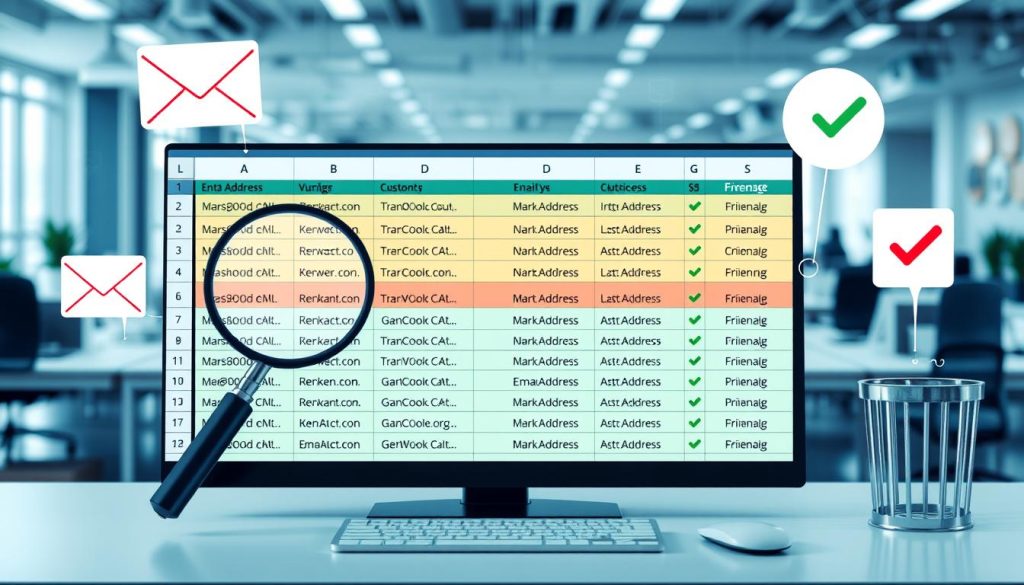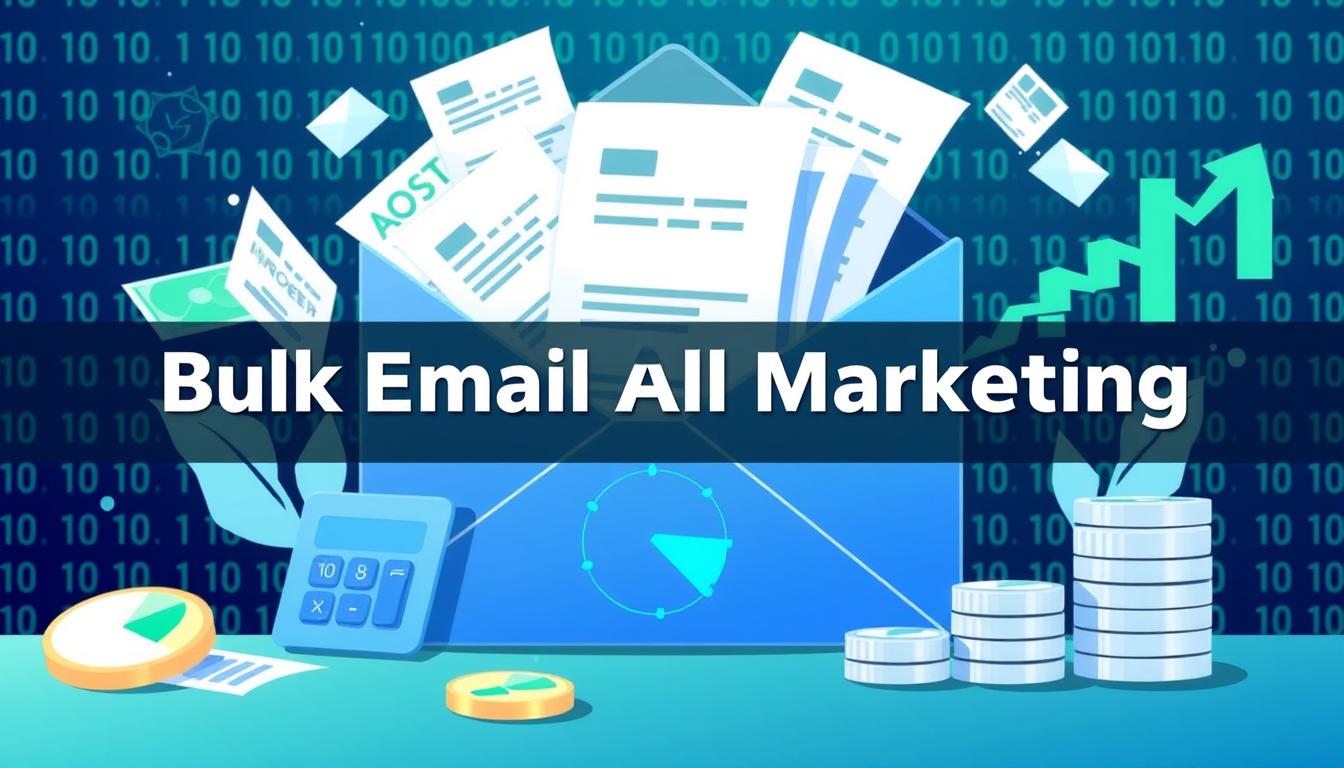Businesses are looking for ways to reach more people. Bulk email marketing is a cost-effective way to do this. But, the real costs of a successful bulk email campaign are more than just the initial price. We’ll look at all the factors that affect the cost of bulk email marketing. This will help you understand what to expect and how to get the most from your budget.
Key Takeaways
- Bulk email marketing involves more than just the service provider fees, with additional costs for list management, content creation, and compliance requirements.
- Understanding the true costs of bulk email campaigns can help businesses make informed decisions and optimize their email marketing budgets.
- Factors like email service provider pricing, list hygiene, and deliverability can significantly impact the overall expenses of bulk email marketing.
- Strategies for improving open and click-through rates can help businesses maximize the ROI of their bulk email campaigns.
- Regular performance analysis and optimization are crucial for maintaining a cost-effective bulk email marketing strategy.
Understanding the Landscape of Bulk Email Marketing
Businesses look for affordable ways to reach more people through email marketing. It’s key to know the difference between good bulk emails and spam. When done well, bulk email can boost brand awareness, get more leads, and save on marketing costs.
Distinguishing Bulk Email from Spam
The main difference is in how it’s done. Bulk email marketing sends messages to people who have agreed to receive them. Spam, on the other hand, is sent without permission and often doesn’t make sense to the recipient. Good bulk email follows rules and adds value, while spam can harm a brand’s image and make it hard to send emails.
The Benefits and Challenges of Mass Email Campaigns
Bulk email marketing has many benefits. It lets businesses:
- Reach lots of potential customers quickly
- Make their brand more visible
- Get more leads and sales
- Save money by sending more emails at once
But, there are also challenges:
- Keeping emails from being marked as spam
- Following changing anti-spam laws
- Making content that people want to read
- Keeping email lists clean and up-to-date
By understanding bulk email marketing, businesses can overcome these hurdles. They can use mass email campaigns to meet their goals and keep their subscribers happy.
“Bulk email marketing, when executed thoughtfully and with respect for the recipient, can be a powerful and cost-effective way to reach new audiences and grow your business.”
The True Costs of Bulk Email Marketing: What You Need to Know
Bulk email marketing seems cheap at first, but it can cost more than you think. It’s key to know all the costs involved.
Email marketing expenses start with what your email service provider (ESP) charges. These costs change based on your list size, needed features, and chosen plan. Pick an ESP that matches your budget and needs.
Other costs include list management and keeping your list clean. A clean list is vital for good campaigns. But, it takes time and might need special tools or services.
Designing and creating your email campaigns also costs. Making emails look good and engaging takes time. You might need to hire professionals or buy design tools.
Lastly, there are compliance and legal requirements to follow. Breaking these rules can lead to big fines and harm your reputation. It’s crucial to follow the rules and best practices.
In short, the true costs of bulk email marketing are more than just the start-up cost. Knowing all the expenses helps businesses plan better. This way, they can make their email marketing successful and cost-effective.
| Cost Factor | Average Estimated Range |
|---|---|
| Email Service Provider (ESP) Fees | $10 – $500 per month |
| List Management and Data Hygiene | $50 – $500 per month |
| Design and Content Creation | $500 – $5,000 per campaign |
| Compliance and Legal Requirements | $100 – $10,000+ per violation |
The real costs can change a lot. They depend on your business size, email strategy, and available resources. Plan and budget well to make your bulk email marketing work and not break the bank.
Email Service Provider Fees
Businesses often face high costs for email marketing due to fees from email service providers (ESPs). These providers offer various plans and features to meet your needs. It’s important to understand these options to save money and get the best results from your campaigns.
Comparing Pricing Plans and Features
ESPs have different pricing models, like pay-per-email or monthly subscriptions. Each plan includes storage, sending limits, and features like list management and automation. When choosing an ESP, think about what you need most and how it fits your budget.
| ESP | Pricing Model | Monthly Emails Included | Additional Email Costs | Key Features |
|---|---|---|---|---|
| Mailchimp | Tiered Subscription | 10,000 – 150,000+ | $0.01 – $0.10 per email | Email templates, audience segmentation, marketing automations |
| Constant Contact | Tiered Subscription | 500 – 50,000+ | $0.01 – $0.15 per email | Email builder, landing pages, e-commerce integrations |
| Sendinblue | Tiered Subscription | 300 – 100,000+ | $0.00009 – $0.005 per email | SMS marketing, marketing automation, transactional emails |
By comparing ESPs, businesses can find the best deal for their email marketing. This leads to cost savings and more effective campaigns. It’s all about getting the most value for your money.
“Choosing the right email service provider can make a significant difference in the success and cost-effectiveness of your email marketing efforts.”
List Management and Data Hygiene
Keeping your email list clean and updated is key for your bulk email campaigns to succeed. Ignoring list management and data hygiene can cause hidden costs and make your mass email campaigns less effective. We’ll look into why these often-forgotten parts of email marketing spending are so important.
Creating and caring for a top-notch email list takes a lot of time and money. From getting the list to keeping it clean, the costs can pile up fast. If you don’t handle these tasks, you might see lower delivery rates, more bounces, and a bad reputation with email providers and your audience.
The Costs of List Management
- List acquisition: Buying or renting email lists can be pricey, with costs from a few cents to several dollars per contact.
- List maintenance: Keeping your list clean, verifying emails, and checking addresses are ongoing tasks that cost money.
- List growth: Growing your list naturally, like with lead magnets or website opt-ins, takes time and effort.
Investing in good list management and data hygiene can save you money in the long run. It makes your bulk email campaigns work better and cuts down on the hidden costs of mass emails. A clean and active email list helps you send more emails that get opened and clicked, leading to better results from your email marketing spending.

“Successful email marketing starts with a clean and up-to-date email list. Neglecting list management can be a costly mistake.”
Good list management and data hygiene are crucial for a successful bulk email marketing plan. Knowing the costs of these key steps helps you make smart choices and use your email marketing spending wisely.
Design and Content Creation Costs
Creating a great email marketing campaign means spending on design and content. These costs can add up, but you can still get a good return on your investment. It’s all about spending wisely.
Leveraging In-House Resources vs. Outsourcing
Businesses have two main choices for design and content: using in-house teams or outsourcing. Each option has its pros and cons to consider.
Using your own team can save money since you don’t pay extra for outside help. But, it might limit your creative options. Outsourcing lets you access more skills and experience, making your emails more engaging.
Deciding between in-house and outsourcing depends on your team’s skills, your email needs, and your budget. Finding the right mix can help you save money and make your emails stand out.
| In-House Resources | Outsourcing |
|---|---|
|
|
By carefully looking at your needs and finding the right balance, you can save on email marketing expenses. This way, you get the best affordable email marketing solutions for your business.
Compliance and Legal Requirements
When it comes to bulk email marketing, following anti-spam laws is key. It can affect the hidden costs of sending out lots of emails. Keeping up with these laws means managing your email list well and making it easy for people to unsubscribe.
Anti-Spam Regulations and Best Practices
Not following anti-spam laws can lead to big fines. It’s crucial for businesses to know and follow these rules. This includes making sure people have signed up to get your emails, offering easy ways to unsubscribe, and keeping your list clean and accurate.
- Understand and comply with the CAN-SPAM Act, which outlines specific requirements for commercial email messages.
- Implement double opt-in processes to confirm recipients’ consent to receive your emails.
- Regularly review and update your mailing list to maintain data hygiene and avoid potential spam complaints.
By focusing on compliance and best practices, you can avoid hidden costs. You also build trust with your audience and avoid legal trouble.
“Staying compliant with anti-spam regulations is not only a legal requirement but also a strategic move to ensure the long-term success of your email marketing campaigns.”
Optimizing Deliverability and Engagement
In the world of bulk email campaigns, getting your emails delivered and engaging your audience is key. By focusing on improving open and click-through rates, you can make the most of your email marketing budget. This approach helps you get the best results from your affordable email marketing solutions.
Strategies for Improving Open and Click-Through Rates
Boosting open and click-through rates is a challenge, but there are effective strategies. These can help you make your bulk email campaigns more successful:
- Personalize your subject lines and email content: Tailoring your messages to your subscribers’ interests can greatly increase engagement.
- Optimize your email design and layout: A clean, visually appealing, and mobile-responsive design can improve the user experience and encourage action.
- Segment your email lists: Dividing your audience into targeted groups can help you send more relevant and effective messages.
- Utilize A/B testing: Trying out different subject lines, content, and call-to-actions can help you find what works best for your audience.
- Monitor and analyze your performance: Keeping track of key metrics like open rates and click-through rates can give you insights to improve your strategy.
By using these strategies, you can improve the deliverability and engagement of your bulk email campaigns. This will help you get better returns on your email marketing investments. It also maximizes the impact of your optimized email marketing budgets.
| Strategy | Description | Impact on Open and Click-Through Rates |
|---|---|---|
| Personalization | Tailoring email content and subject lines to individual subscriber preferences | Significant increase in open and click-through rates |
| Optimized Design | Creating a clean, visually appealing, and mobile-responsive email layout | Improved user experience and higher click-through rates |
| Audience Segmentation | Dividing email lists into targeted groups based on subscriber behaviors and preferences | Enhanced relevance and higher open and click-through rates |
| A/B Testing | Experimenting with different subject lines, content, and call-to-actions | Identification of the most effective strategies for your audience |
| Performance Monitoring | Tracking key metrics, such as open rates, click-through rates, and conversion rates | Valuable insights to refine your email marketing approach |
“By implementing these strategies, you can unlock the true potential of your affordable email marketing solutions and maximize the impact of your optimized email marketing budgets.”
Measuring and Analyzing Campaign Performance
It’s key to measure and analyze your bulk email marketing campaigns. This helps you understand their costs and how to spend your email marketing budget wisely. By tracking important metrics and analyzing data, you can make smart choices to boost your email marketing’s return on investment (ROI).
Let’s look at the main performance indicators (KPIs) for your bulk email campaigns:
- Open rate: The percentage of recipients who opened your email.
- Click-through rate (CTR): The percentage of recipients who clicked on a link in your email.
- Conversion rate: The percentage of recipients who took a desired action, such as making a purchase or signing up for a service.
- Bounce rate: The percentage of emails that were undelivered.
- Unsubscribe rate: The percentage of recipients who opted out of your mailing list.
Tracking these metrics gives you insights into your email marketing’s success. For instance, a low open rate might mean you need to work on your subject lines or sender name. A low CTR could suggest you need to improve your email content and calls-to-action.
Also, understanding the costs of your bulk email marketing campaigns is crucial. This includes costs for your email service provider, list management, design, content creation, and legal compliance. Knowing the true costs helps you manage your budget better and make strategic decisions about where to invest.
| Metric | Description | Optimal Range |
|---|---|---|
| Open rate | Percentage of recipients who opened your email | 15-25% |
| Click-through rate (CTR) | Percentage of recipients who clicked on a link in your email | 2-5% |
| Conversion rate | Percentage of recipients who took a desired action | 1-3% |
| Bounce rate | Percentage of emails that were undelivered | Less than 2% |
| Unsubscribe rate | Percentage of recipients who opted out of your mailing list | Less than 0.5% |
By regularly checking and analyzing these metrics, you can improve your email marketing. This boosts the ROI of your campaigns and ensures your bulk email marketing expenses are well-spent.

Conclusion
The costs of bulk email marketing are complex, including fees for email services and the need to follow rules. Understanding these costs helps businesses make better choices. This way, they can use their email marketing budgets wisely.
This article has covered many important points. It talked about the different pricing plans from email service providers and the need to follow anti-spam laws. Knowing these details helps you plan and run effective bulk email campaigns. This approach can lead to better results and a higher return on investment.
Managing the costs of email marketing is crucial, whether you handle it yourself or outsource it. The goal is to find a balance between quality, efficiency, and staying within your budget. By improving how you send emails and engaging your audience, you can make your marketing more effective. This ensures your message gets to the right people and leads to meaningful actions.
FAQ
What are the true costs of bulk email marketing?
Bulk email marketing costs include fees from service providers and expenses for list management. You also need to consider design and content creation, legal compliance, and efforts to improve delivery and engagement. Knowing these costs helps manage your budget well.
How do we distinguish bulk email from spam?
Bulk email is different from spam. Bulk emails go to people who have signed up to receive them. Spam, on the other hand, is unwanted and can harm your reputation and delivery rates.
What are the benefits and challenges of mass email campaigns?
Mass email campaigns can boost brand awareness and generate leads. They can also improve customer engagement. But, they can face challenges like delivery issues, legal concerns, and being seen as spam if not managed right.
How do email service provider (ESP) fees impact our email marketing budget?
ESP fees are a big part of bulk email marketing costs. Different providers offer different plans and features. Choosing the right one for your business is key to saving money.
What are the costs associated with list management and data hygiene?
Keeping your email list clean and updated is crucial. Costs include buying lists, verifying data, segmenting lists, and ongoing management. This ensures your campaigns are successful and compliant.
How can we balance the costs of design and content creation for our email campaigns?
Creating engaging email content costs money. You need to decide between using in-house resources or hiring freelancers. Finding the best balance for your budget is important.
What are the compliance and legal requirements we need to consider in bulk email marketing?
Following anti-spam laws like CAN-SPAM and GDPR is essential. Costs include list management, unsubscribe options, and penalties for breaking the law. These can affect your budget a lot.
How can we optimize the deliverability and engagement of our bulk email campaigns?
To improve your campaigns, focus on segmentation, personalization, and design. Regularly check how well your campaigns are doing. This helps you make better decisions and save money.
How can we measure and analyze the performance of our bulk email marketing campaigns?
Tracking key metrics like open rates and ROI is crucial. It helps you understand your campaigns’ costs and make them more efficient. This way, you can make better decisions and save money.


